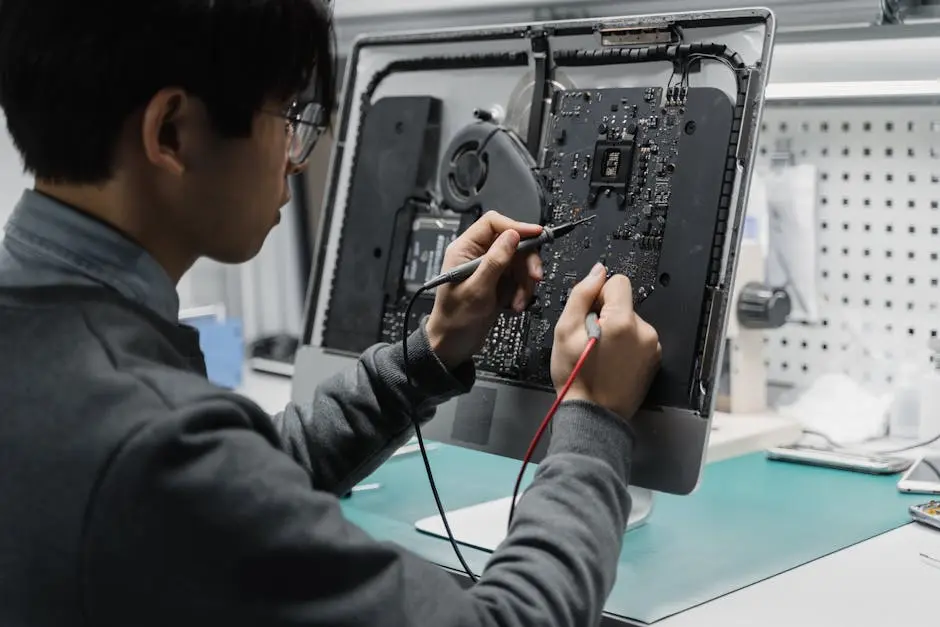In today’s digital age, keeping your computer running smoothly is more important than ever. Whether you’re working from home or enjoying some leisure time, a well-maintained PC can make all the difference. In this blog, we’ll explore some essential maintenance tips that can help prevent potential problems and keep your machine performing at its best.
1. Regularly Clean the Exterior
Dust and grime can accumulate on your computer, causing it to overheat or slow down. Regular cleaning keeps it looking new and functioning well.
Imagine the dust and dirt that settles on the outside of your PC. Over time, this can seep into the inside, clogging up valuable components. Simple cleaning with a microfiber cloth can do wonders to remove dust from keyboards, screens, and vents. While you’re at it, don’t forget hidden nooks – they all play a part in keeping your PC wholesome.
It’s amazing what a little attention can do. Use compressed air to gently blow out debris from your keyboard and vents, targeting areas most prone to dust accumulation. Make sure to keep liquids away from your devices to prevent any unfortunate accidents. Regular cleaning not only enhances appearance but supports system longevity.
2. Organize Your Files
Keeping your files organized can significantly affect your PC’s performance. Regularly sorting and deleting unnecessary files can speed up your system.
File organization might sound overwhelming, but there’s no need to dread it. Start small by creating folders for different file types or projects and consistently save your documents in the right places. Before you know it, you’ll have a neat and tidy file system that is a pleasure to navigate.
Every now and then, perform a thorough ‘spring cleaning’ of your digital files. Go through your downloads folder, empty your recycling bin, and delete duplicate files. File mismanagement leads to clutter, which can slow down your computer, so decluttering can breathe new life into your PC.
3. Run Antivirus Software
Antivirus software helps protect your computer from malware and other online threats. Regular scans can prevent infections that might slow down your machine.
In a world brimming with cyber threats, running antivirus scans is like giving your PC a regular health check-up. Schedule frequent scans to ensure any potential threats are caught early. Choose reputable antivirus software and keep it consistently updated for optimal protection. If in doubt, a quick search for ‘computer repair near me’ can lead you to professionals who can offer tailored solutions.
4. Update Software Regularly
Keeping your software up to date ensures that you benefit from the latest security patches and performance improvements.
We often ignore update prompts, but timely software updates are crucial. Not only do they improve functionality, but they also secure your software against vulnerabilities. Most applications have options to enable automatic updates which can be a real time-saver.
5. Manage Startup Programs
Too many programs running at startup can slow down your computer. Review these programs and disable those you don’t need immediately at boot.
Investing a few minutes to control which programs execute at startup can carve out significant improvements in boot time. Identify the essentials and disable the rest without hesitation. This simple tweak can have a noticeable impact on your PC’s morning routine.
6. Check Hard Disk Space
Keeping an eye on your hard disk space can prevent performance issues. Delete old files and defragment your drive to keep it running efficiently.
Regularly checking hard disk space is vital for steady performance. Explore your storage settings to visualize space usage and pinpoint unnecessary bulky files or applications. Freeing up disk space allows your computer to access files more effectively, leading to smoother operation.
Consider investing in external storage or cloud solutions to offload aging files you wish to keep but don’t need immediate access to. Defragmentation, a process of rearranging fragmented data, helps enhance efficiency – making it a valued task to incorporate into your routine.
7. Backup Important Data
Regular backups protect your data from accidental loss. Whether using an external drive or cloud service, ensure you have a backup routine.
Data backups are your safety net against unforeseen disasters. Allocate time to schedule consistent backups—many platforms offer automation to streamline this process. Local hard drives are a classic choice, while online cloud services afford you flexibility and accessibility from anywhere.
8. Keep Your System Cool
Overheating can damage components and slow down your PC. Make sure your computer stays cool with proper ventilation and regular fan checks.
Vigilant monitoring of your PC’s temperature is crucial. Place your system in a well-ventilated area to facilitate airflow. Routinely examine its fans and vents for blockages, whether internal or external. If overheating persists, seek out ‘computer repair near me’ for expert assessment—sometimes an upgrade to a more advanced cooling system could be the remedy.
9. Seek Professional Help When Necessary
If issues persist, consulting a ‘computer repair near me’ can be invaluable. Professionals can diagnose and fix problems that might be out of your skill set.
There’s no shame in admitting that certain issues require expert handling. Technicians specializing in computer repairs are armed with the skills and tools required to solve complicated problems efficiently. When all else fails, their inputs can redeem your computer from persistent woes.

